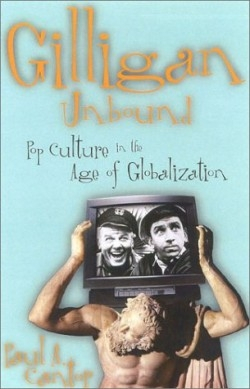
Gilligan Unbound
Pop Culture in the Age of Globalization
“Gilligan’s Island must be the most successful bad show in the history of television,” asserts the author in this collection of interrelated essays exploring the relevance of pop icons in “the age of globalization.”
Providing an in-depth study of Gilligan’s Island, Star Trek, The Simpsons, and The X-Files, the author examines what each series reflected about America in its era. Cantor, a Professor of English at the University of Virginia and a frequent contributor to The American Enterprise, has assembled this volume based on lectures he has given on popular culture. He devotes an essay to a detailed analysis of the deeper meanings of each of the four television programs.
In his essay about Gilligan’s Island, Cantor analyzes and presents the model of the island as representing the liberal democratic ideal. “Whether by design or happy accident, or more likely a combination of the two,” he says, “the show turned out to provide a perfect reflection of the liberal democratic regime of the United States.” Cantor’s analysis of Star Trek further establishes the theory that TV reflects America’s political stance; in the late ‘60s, it was America’s cold war ideology. In this essay, the narrative becomes discursive, and runs into the realm of over-intellectualized obscurity. Cantor digresses into Fukuyama’s Phenomenology, eventually coming around to theoretically establishing Captain Kirk and former President George H. Bush as closet Hegelians.
Cantor’s essay about The Simpsons is engaging and enjoyable. He discusses how the shift in American perception of government is exemplified by this series. His piece on The X-Files continues along the same lines.
Gilligan Unbound is, overall, well argued. Cantor substantiates all of his assertions with examples from each series. It is natural to expect that a television series will be a sign of the times—a barometer of the sensibility of America. Pop culture is, by its very nature, reflective. At times, Cantor’s prose is not particularly exciting, and he does digress. The book is clearly influenced by his university experience; it is sometimes reminiscent of a dissertation. While most of his theories are solid, there are moments where the reader may feel that Cantor is guilty of assigning a bit too much meaning to these sitcoms. After all, it should not be forgotten that the purpose of these television series is not only to provide a means of escape, but to entertain.
Disclosure: This article is not an endorsement, but a review. The publisher of this book provided free copies of the book to have their book reviewed by a professional reviewer. No fee was paid by the publisher for this review. Foreword Reviews only recommends books that we love. Foreword Magazine, Inc. is disclosing this in accordance with the Federal Trade Commission’s 16 CFR, Part 255.
